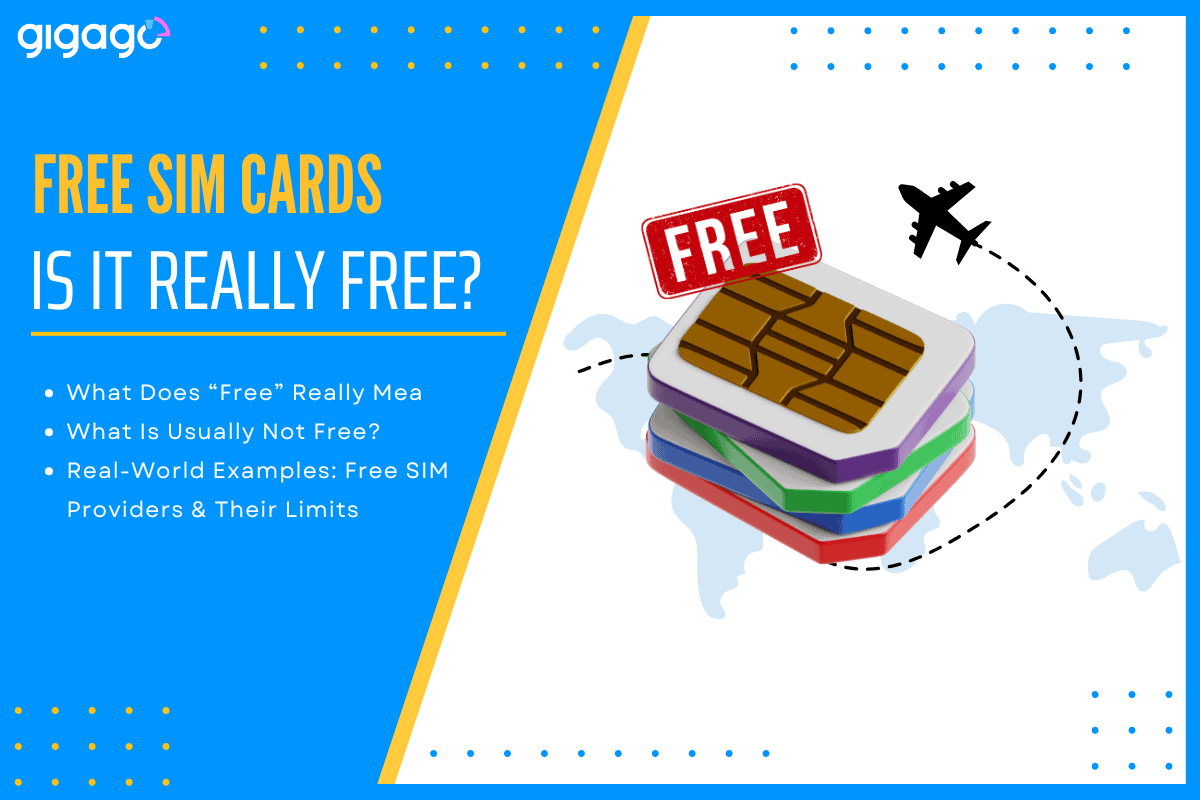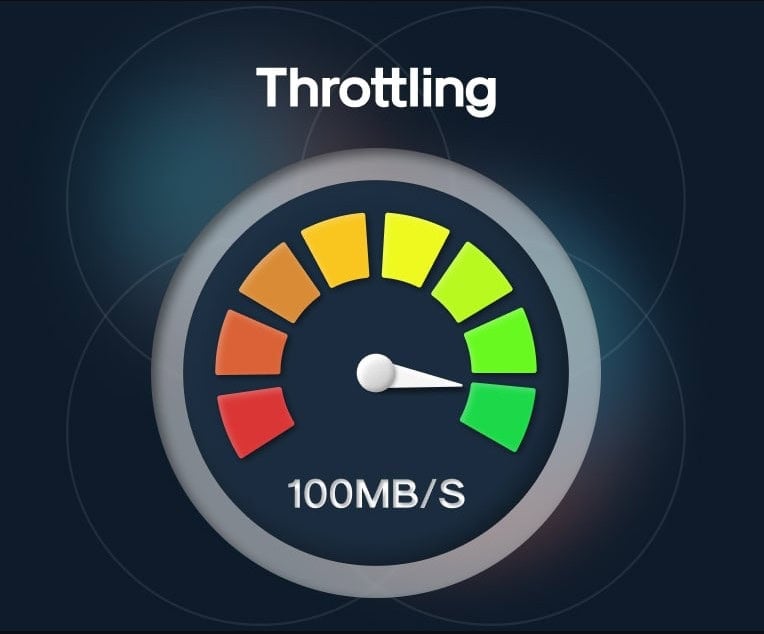When you shop for a travel eSIM or glance at your phone’s status bar, you will often see your phone show network types like “LTE”, “4G”, or sometimes even “5G”. Most people just assume it means “fast internet” and move on – which is fair enough, but there’s a bit more to it than that. […]
Free SIM Cards – Is It Really Free?
When planning travel abroad, staying connected is a top priority. At baggage claim, you spot a booth advertising “FREE SIM CARDS!”. At first glance, it sounds like a great deal—why pay when you can get it for free? But as many travelers have discovered, they’re hit with unexpected charges, slow data speeds, or discover the SIM doesn’t work at their destination. That “free” SIM often comes with unexpected catches. So the question is: “Free SIM cards – Is it really free?”
This article breaks it down clearly for you. Let’s take a closer look at what “free SIM” really means—and if it’s the right choice for your trip.

In this article
I. What Does “Free” Really Mean in the SIM Card World?
When you see “free SIM card” advertised, it doesn’t always mean no cost.
In telecommunications, “free” is a flexible term that means different things depending on who’s offering it.
- Free as in price: Sometimes, “free” means you don’t pay for the SIM card itself, but you still need to pay money to activate it or add credit before it works.
- Free as in flexibility: Other times, the SIM is locked to one network or phone type. This means you can’t use it with your own phone or switch to another network.
- Free as a trial: In some cases, it’s a free trial – you get a few days of service, but after that, it becomes a paid plan unless you cancel it in time.
The psychology of “free” is what makes these offers so effective. When something is free, our brains focus on that fact and ignore any downsides. We often trust the word “free” too quickly. It’s easy to think there’s no risk, but small details can lead to unexpected problems or costs. So it’s always good to check the full offer.
II. What Is Usually Not Free? (Common Hidden Costs)
Even if the SIM card is free, using it may cost money. Here are some common things that are not free:
- Activation fees or required top-ups: You may need to pay an activation fee or add money before using it.
- Data caps, throttling, and limited speeds: Some SIMs give you only a small amount of data, and the speed may slow down after that. They often involve “unlimited” plans.
- Device or network compatibility issues: The SIM might not work with your phone, especially if your phone is locked or not supported.
- SIM expiration if inactive: If you don’t use the SIM soon after getting it, it may expire and stop working.
- Privacy trade-offs: Some providers track your activity or show you ads to make money from your use.
These hidden costs can be frustrating, especially when you’re traveling and need a reliable connection.

III. Real-World Examples: Free SIM Providers & Their Limits
Many companies offer free SIM cards, but each one works differently. Understanding what these companies actually provide helps you see past the marketing. Here are a few popular ones:
- Lyca Mobile: Free SIM with limited data, but you need to top up to keep using it.
- AirTalk Wireless / SafeLink: Free for low-income users in the U.S., but not useful for travel abroad.
- giffgaff: Free SIM in the UK, but you must buy a plan to use data.
- Mint Mobile: You get the SIM free if you buy a plan, not truly free on its own.
- FreedomPop / TextNow: Offer free basic service, but with ads and limited features.
While these may work well locally, they are not always the best option for international travel.
IV. Why Free SIMs Often Fail for International Travel
Free SIM cards are usually made for use within one country. If you’re traveling to other countries, they may not work or may cost extra.
- Domestic-only coverage: Many free SIMs don’t support international roaming. If they do, it can be expensive or very limited.
- Poor customer service abroad: If you have problems while abroad, it may be hard to get help from these providers.
- Physical SIM logistics: If you order a free SIM online, you might have to wait for shipping or deal with activation delays, which can be stressful during travel.
- Surprise charges when traveling: Exchange rates, foreign transaction fees, and unexpected roaming triggers can all lead to charges you never anticipated.
V. Why eSIM is Better for Global Travelers?
If you are going to another country, a better option is using an eSIM. Understanding what eSIM is helps explain why it’s rapidly becoming the preferred choice.
An eSIM (embedded SIM) is a digital version of a traditional SIM card. Instead of inserting a physical card, you can activate mobile service instantly by scanning a QR code or using an app – no shipping, no waiting, no hassle.
What are benefits of travel eSIMs?
Using an eSIM is great for travel because of these benefits:
- Connect to local networks as soon as you land
- Know exactly what you’re paying for. No contracts. No hidden fees.
- Choose from local, regional, or multi-country eSIMs tailored to your itinerary.
- Recharge your data anytime, anywhere (varied by providers)
- Change plans or carriers without changing SIMs.
- Keep your primary SIM active for receiving calls, SMS, or OTPs while using data on your eSIM.
At GIGAGO, we offer eSIM plans made for international travelers. You get fast, flexible service that works across countries, with no contract or surprise charges.
VI. How to Choose the Right SIM or eSIM for Your Trip
Before picking a SIM or eSIM, ask yourself a few simple questions:
- Where am I going?
- How much data will I need?
- Is my phone able to use eSIM?
If you’re only staying in one place, a free SIM may be okay. But if you’re traveling to more than one country, or want to avoid delays and hidden costs, an eSIM is the better choice.
Here’s a quick comparison:
| Features | Free SIM | Paid SIM | eSIM (Gigago) |
| Setup Time | Slow | Medium | Fast |
| Extra Fees | Common | Sometimes | Rare |
| International Use | Limited | Some | Excellent |
| Activation | Manual | Manual | Instant |
| Best For | Local use | Short trips | Global travel |
It’s easier to compare your options when you look at the full picture – not just the upfront cost. A free physical SIM might seem like a good deal at first. But when you consider the shipping time, limited coverage, possible roaming fees, and the inconvenience of swapping SIM cards, it may not be the better choice after all.
When you weigh these factors, the downsides of free SIMs become much clearer.
VII. Conclusion
Free SIM cards may look like a good deal, but they often come with limits or hidden charges. For travelers, these surprises can lead to problems, delays, or extra costs.
If you want a simple, fast, and reliable way to stay connected while traveling, an eSIM is the smarter choice. It works across countries, is easy to set up, and doesn’t come with any surprises.





